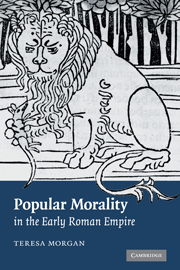Book contents
- Frontmatter
- Contents
- Preface
- List of illustrations
- List of tables
- List of abbreviations
- 1 Introduction
- PART ONE
- 2 Proverbs
- 3 Fables
- 4 Gnomai
- 5 Exempla
- 6 Patterns
- PART TWO
- PART THREE
- Conclusion
- Appendix 1 The political and literary connections of Babrius
- Appendix 2 The definition of a miscellany
- Appendix 3 Popular morality and philosophical doctrine
- List of papyri
- Bibliography
- Index
5 - Exempla
Published online by Cambridge University Press: 27 October 2009
- Frontmatter
- Contents
- Preface
- List of illustrations
- List of tables
- List of abbreviations
- 1 Introduction
- PART ONE
- 2 Proverbs
- 3 Fables
- 4 Gnomai
- 5 Exempla
- 6 Patterns
- PART TWO
- PART THREE
- Conclusion
- Appendix 1 The political and literary connections of Babrius
- Appendix 2 The definition of a miscellany
- Appendix 3 Popular morality and philosophical doctrine
- List of papyri
- Bibliography
- Index
Summary
Example is always more efficacious than precept.
Dr JohnsonThe tradition of using the sayings and doings of famous men and women of the past as examples to be imitated or avoided goes back at least to classical Greek literature. Fifth-century Athenians heard the glories of their ancestors recited in funeral speeches. By the fourth century, Attic orators referred regularly to characters of the past and invoked the past as a guide to the future. The idea of the example as a ‘gold standard’ of behaviour can be found in Plato, and other fourth-century authors explicitly encouraged the reading of their own works in this way. Xenophon, for instance, recommends the virtue of King Agesilaus of Sparta, as illustrated in Xenophon's own biography, as a guide for others, while Isocrates provides exemplary stories in his essays and commends them to his students.
The collecting of stories began in the classical period and became increasingly popular in the Hellenistic world. Metrocles the Cynic was among those credited with inventing the philosophical collection, and Cynics proved particularly good subjects, famous as they were for their outrageous statements and behaviour. A series of chreiai about Diogenes the Cynic survives in a papyrus school text of the fourth century ce: ‘Seeing a fly on this table, he said, “Even Diogenes nurtures parasites.” Seeing a woman learning her letters, he said, “What a sword is being sharpened!” … Seeing an Aethiopian munching bread, he said, “The night is consuming the day.”’
- Type
- Chapter
- Information
- Popular Morality in the Early Roman Empire , pp. 122 - 159Publisher: Cambridge University PressPrint publication year: 2007
- 1
- Cited by



